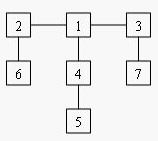Balancing Act(樹的重心)
阿新 • • 發佈:2017-07-17
rest blog plm efi pro 中心 des != forest 傳送門
Balancing Act
For example, consider the tree:

Deleting node 4 yields two trees whose member nodes are {5} and {1,2,3,6,7}. The larger of these two trees has five nodes, thus the balance of node 4 is five. Deleting node 1 yields a forest of three trees of equal size: {2,6}, {3,7}, and {4,5}. Each of these trees has two nodes, so the balance of node 1 is two.
For each input tree, calculate the node that has the minimum balance. If multiple nodes have equal balance, output the one with the lowest number.
Balancing Act
| Time Limit: 1000MS | Memory Limit: 65536K | |
| Total Submissions: 14070 | Accepted: 5939 |
Description
Consider a tree T with N (1 <= N <= 20,000) nodes numbered 1...N. Deleting any node from the tree yields a forest: a collection of one or more trees. Define the balance of a node to be the size of the largest tree in the forest T created by deleting that node from T.For example, consider the tree:

Deleting node 4 yields two trees whose member nodes are {5} and {1,2,3,6,7}. The larger of these two trees has five nodes, thus the balance of node 4 is five. Deleting node 1 yields a forest of three trees of equal size: {2,6}, {3,7}, and {4,5}. Each of these trees has two nodes, so the balance of node 1 is two.
For each input tree, calculate the node that has the minimum balance. If multiple nodes have equal balance, output the one with the lowest number.
Input
Output
Sample Input
1 7 2 6 1 2 1 4 4 5 3 7 3 1
Sample Output
1 2
Source
POJ Monthly--2004.05.15 IOI 2003 sample task 【思路】 求樹的重心 樹的中心:刪掉這個點後,所形成的連通塊最大的最小。 dp[i]為刪掉這個點後最大的連通塊的值。 edge數組開小了runtime erroe 【code】#include<iostream> #include<cstdio> #include<cstring> using namespace std; int n,x,y,G,sumedge,t; int head[20001],size[20001],dad[20001],dp[20001]; struct Edge { int x,y,nxt; Edge(int x=0,int y=0,int nxt=0):x(x),y(y),nxt(nxt){} }edge[40017]; void add(int x,int y) { edge[++sumedge]=Edge(x,y,head[x]); head[x]=sumedge; } void init() { sumedge=0; memset(head,0,sizeof(head)); memset(size,0,sizeof(size)); memset(dad,0,sizeof(dad)); memset(dp,0,sizeof(dp)); scanf("%d",&n); for(int i=1;i<n;i++) { scanf("%d%d",&x,&y); add(x,y); add(y,x); } } void dfs(int x) { size[x]=1; for(int i=head[x];i;i=edge[i].nxt) { int v=edge[i].y; if(dad[x]!=v) { dad[v]=x; dfs(v); size[x]+=size[v]; dp[x]=max(dp[x],size[v]);//最大的孩子 } } dp[x]=max(dp[x],n-size[x]);//不是子樹的那一堆 } void print() { int ans=0x7fffff; for(int i=1;i<=n;i++) if(dp[i]<ans)ans=dp[i],G=i; printf("%d %d\n",G,ans); } int main() { scanf("%d",&t); while(t--) { init(); dfs(1); print(); } return 0; }
Balancing Act(樹的重心)
